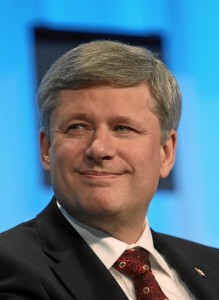Canada threatens to boycott 2013 CHOGM in Sri Lanka over human rights issue
Stephen Harper’s government, which alienated many Tamil-Canadians in the last days of Sri Lanka’s civil war in 2009, is aggressively
campaigning to pressure Sri Lanka on human rights and political reconciliation.
It’s a dramatic shift in the Conservative approach to Sri Lanka’s fractured politics. For years they vilified the separatist Tamil Tigers as terrorists, and didn’t vocally criticize the Sinhalese-majority government for discriminating against minority Tamils. The new approach, a mix of diaspora politics and foreign-policy principles, will have implications abroad and at home with a long-frustrated Tamil-Canadian community.
Mr. Harper warned this month that he’ll boycott the 2013 Commonwealth summit in Sri Lanka if that government doesn’t show accountability for human-rights abuses and take steps to reconcile with the Tamil minority, and suggested other leaders do the same – a threat, widely reported abroad, that will likely make Sri Lanka a topic at next month’s Commonwealth summit in Australia.
Foreign Minister John Baird has made the campaign a priority, taking up the cudgel in a UN speech last week, in talks with foreign counterparts and meetings with Sri Lankan officials.
Last Thursday, he told Sri Lanka’s Foreign Affairs Minister, G.L. Peiris, that Canada wants progress on human rights and post-civil war reconciliation, pushing back, according to a summary provided by sources, against Mr. Peiris’s “trust us” assurances.
He met earlier this month with Sri Lankan envoy Chitranganee Wagiswara, raising allegations of abuses during the civil war that ended in 2009, and complained that Sri Lanka barred UN investigators, showed a lack of accountability and used “heavy-handed tactics” since the war. “We want to see action,” said Chris Day, Mr. Baird’s spokesman.
In his meetings with Sri Lankan officials, Mr. Baird noted Canada had listed the Tamil Tigers as a terrorist group – apparently to make a point that Ottawa now expects respect for human rights from Sri Lanka.
Sri Lanka denies abuses, but in March, a UN panel found “credible allegations” that in the last months of the war the government shelled civilians, no-fire zones and hospitals, and after the war ended, tortured some in camps for displaced people.
Others, such as the United States, are also pressuring Sri Lanka, but now Canada, which provided $200-million in aid to Sri Lanka since 2006, is working to widen the campaign.
It may also have an impact in Canada, in the 300,000 strong Tamil-Canadian community that felt unheard in the last, bloody days of the civil war.
Tens of thousands in Toronto and Ottawa protested abuses, but complained the government didn’t speak up early enough or loud enough, and that opposition parties stayed too quiet. Young Tamil-Canadians often seemed most outraged.
“It was devastating. They weren’t saying anything,” said Aranee Muru, 21, who took a year off from university for protests. “Democracy needs to speak louder.”
There was history. The Tories accused some Liberals of getting too close to Tiger organizers to court Tamil-Canadian votes. For some Tories, the war pitted terrorists against an elected government, so they were slow to speak out; some Liberals feared accusations of pandering to Tiger sympathy.
Now, the Tigers have lost the war, but there’s no reconciliation. Mr. Baird met a group of Tamil-Canadians two weeks ago and took complaints to Sri Lanka’s government.
There is politics: the Liberal lock on Toronto-area ridings with big Tamil-Canadian populations has been broken by the Tories and NDP. The community is being courted.
But pressuring Sri Lanka to reconcile, on principle, is again a topic for all parties, and might also reconcile Tamil-Canadians to their politicians.
“People felt really frustrated at the time of the civil war” said Quintus Thuraisingham, a Toronto Tamil radio show panelist who met Mr. Baird two weeks ago. “We’re happy they’re coming forward to listen, and openly saying things about them.”
Globe and Mail
– Campbell Clark writes on foreign affairs from Ottawa


October 1, 2011 at 2:15 am
[…] Konversion zum Buddhismus einen Weg fanden der Diskriminierung durch das Kastensystem zu entgehen.Das Theravada wird heute vor allem in Sri Lanka, Birma, Thailand und den Ländern Laos und Kambodsch…Insel gesandt und tatsächlich wurde der Theravada schon bald die Staatsreligion des Königreichs. […]